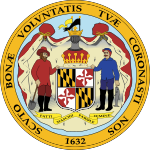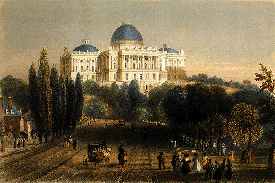
The 19th United States Congress was a meeting of the legislative branch of the United States federal government, consisting of the United States Senate and the United States House of Representatives. It met in Washington, D.C. from March 4, 1825, to March 4, 1827, during the first two years of John Quincy Adams's presidency. The apportionment of seats in the House of Representatives was based on the 1820 United States census. The Senate had a majority of Jackson Men, while the House had an Anti-Jackson (pro-Adams) majority.

William Pinkney was an American statesman and diplomat, and was appointed the seventh U.S. Attorney General by President James Madison.
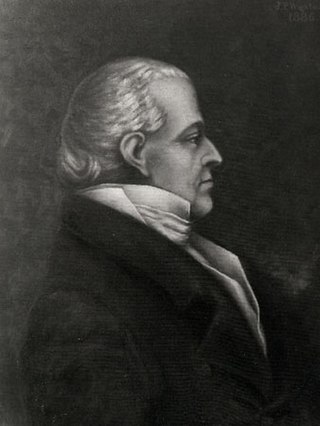
Robert Wright was an American politician and soldier who fought in the American Revolutionary War.
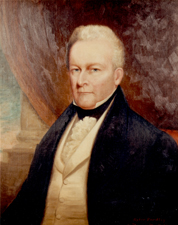
Edward Lloyd V was an American politician and slaveholder. He served as the 13th Governor of Maryland from 1809 to 1811, and as a United States Senator from Maryland between 1819 and 1826. He also served as a U.S. Congressman from the seventh district of Maryland from 1807 to 1809. Frederick Douglass described the life of the enslaved people forced to work on his plantation.

These are tables of congressional delegations from Maryland in the United States House of Representatives and the United States Senate.
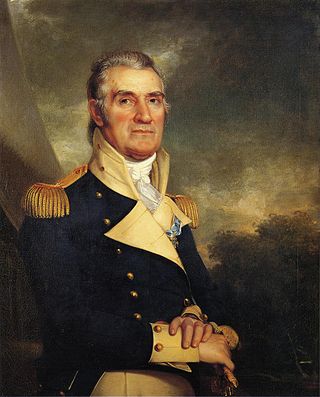
Samuel Smith was an American Senator and Representative from Maryland, a mayor of Baltimore, Maryland, and a general in the Maryland militia. He was the older brother of cabinet secretary Robert Smith.

Joseph Kent was an American politician and planter who was a United States Senator from Maryland, serving from 1833 until his death in 1837. He also served in the House of Representatives, representing the 2nd congressional district of Maryland from 1811 to 1815 and again from 1819 to 1826, and as the 19th Governor of Maryland from 1826 to 1829.

The 1826–27 United States House of Representatives elections were held on various dates in various states between July 3, 1826, and August 30, 1827. Each state set its own date for its elections to the House of Representatives before the first session of the 20th United States Congress convened on December 3, 1827. They occurred during John Quincy Adams's presidency. Elections were held for all 213 seats, representing 24 states.

William Schley was an American lawyer, jurist, and politician who served as governor of Georgia from 1835 to 1837.
Chauncey Forward was an American politician who served as a Jacksonian member of the U.S. House of Representatives from Pennsylvania.
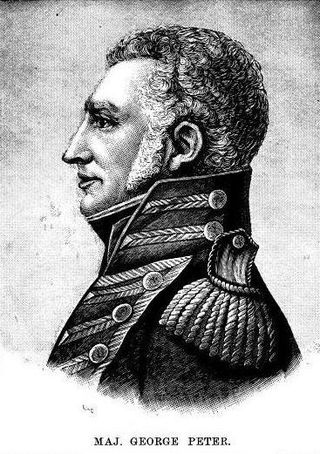
George Peter was a U.S. Representative from Maryland.
Albert Haller Tracy was an American lawyer and politician from New York.
David Jennings (1787–1834) was a 19th Century American lawyer and politician who served as a United States Representative from Ohio for part of one term from 1825 to 1826.
Events from the year 1790 in the United States.

Pennsylvania elected its members October 10, 1826.

The following is a list of federal, state, and local elections in the U.S. state of Maryland and can refer to one of the following elections:

On May 1, 1826, Alexander Thomson (J) of Pennsylvania's 13th district resigned. A special election was held to fill the resulting vacancy on October 10, 1826, the same day as the general elections to the 20th Congress.

Vermont elected its members September 5, 1826. It required a majority for election, which was not met on the first vote in two districts, requiring additional elections held December 4, 1826 and February 5, 1827.

A special election was held in Maryland's 2nd congressional district on February 1, 1826 to fill a vacancy caused by the resignation of Joseph Kent (A), who had been elected Governor of Maryland.
The 1826 United States elections occurred in the middle of Democratic-Republican President John Quincy Adams's term. Members of the 20th United States Congress were chosen in this election. The election took place during a transitional period between the First Party System and the Second Party System. With the Federalist Party no longer active as a major political party, the major split in Congress was between supporters of Adams and supporters of Andrew Jackson, who Adams had defeated in the 1824 Presidential election.
This page is based on this
Wikipedia article Text is available under the
CC BY-SA 4.0 license; additional terms may apply.
Images, videos and audio are available under their respective licenses.
